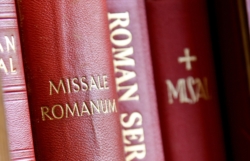Preparing for the new Mass translation
BRIGHTON -- The Archdiocese of Boston has begun its preparations for the upcoming new translation of the Mass.
The first step in that process is educating priests.
"We want priests to be on board right from the beginning, so we're focusing on priests," said Father Jonathan Gaspar, co-director of the archdiocese's Office for Worship and Spiritual Life.
From June 2-4, the archdiocese hosted a seminar to help familiarize priests with the new translation of the third edition of the Roman Missal and the spiritual opportunities it provides. The conference, which was attended by about 30 priests from Boston and neighboring dioceses, also exposed priests to practical strategies and new media resources to help their congregations become more acquainted with the translation.
The seminar was entitled "Preparing for the New Roman Missal: A Summer Institute for Priests" and held at St. John's Seminary. Presenters were Msgr. James Moroney on June 2 and 4 and Father Dennis McManus on June 3.
Msgr. Moroney is a consultant to the Vatican's Congregation for Divine Worship and the Discipline of the Sacraments and a faculty member at St. John's Seminary. He is also executive secretary of the Vox Clara Committee, appointed by the Vatican in 2001 to advise on the translation of Latin liturgical texts into English. Msgr. Moroney is the rector of Cathedral of St. Paul in Worcester.
Father McManus is an advisor to Vox Clara and a theological advisor to the Archbishop of New York. He is a priest of the Diocese of Mobile, Ala.
"Over the last few days, we have gotten a very detailed look into the process of the translation of the present texts and also looking at the important questions of translating the historical development of the Roman Missal and questions of what does it mean to pray in the vernacular," Father Gaspar said.
Father Gaspar also said there were presentations on the development of the English language translation and how a translation of Latin texts should incorporate the meanings and metaphors contained in the original Latin.
"Many of those riches were lost in the original translation," he added.
Msgr. Moroney said that his opening-day presentations discussed the reasons for the new translations and how they foster a "deeper appreciation of liturgy." That day, Msgr. Moroney also led a demonstration Mass where priests could hear the new Mass as it will sound when the new translations are authorized to take effect.
Msgr. Moroney said the new translations are anticipated to be in use beginning Advent 2011.
He returned on the final day of the seminar to discuss resources available to priests and the role of the homily in the Mass.
The presentations on June 3 focused on the theology behind prayers said at Mass and featured a panel discussion on preaching.
Father Geoffrey Deeker, a Stigmatine priest from the Diocese of Springfield, said the conference was beneficial.
"At the same time, it's also showing the challenge that is before us in terms of catechesis, just unpacking the mystery we're celebrating, and the words we're using to articulate that," Father Deeker said.
Father Deeker said the process of preparing the laity must begin with their spiritual leaders.
"The challenge is on the shoulders of the clergy to do this," Father Deeker said.
Conference attendee Father Joseph Cooper, rector of St. Joseph Cathedral in Manchester, N.H., agreed with that sentiment.
"If we as priests are able to embrace this wholeheartedly, than we can lead the people we serve to embrace this wholeheartedly as well," Father Cooper said. "As we allow the words of this translation to enter into our ministry as priests we can communicate this in a more peaceful way to the people who we serve."
Father Gaspar spoke to the Pilot on plans to introduce the clergy and laity of the Boston archdiocese to the new translation, saying the St. John's conference was part of that plan.
"It's the first of many opportunities that priests, deacons, and laity throughout the archdiocese will have (to learn) about the changes that will be coming," Father Gaspar said.
Efforts to introduce local Catholics to the translation will consist of three phases, Father Gaspar said, with the first being outreach to priests and deacons, the second being parish leaders, and the third being parish staff and ultimately the congregations.
On Sept. 22 and 23, the archdiocese will host a workshop entitled "Welcoming the 3rd Edition of the Roman Missal" at Our Lady Help of Christians Parish in Newton, which will prepare priests, deacons, and officials from the archdiocese to run workshops on the translation.
The plan to prepare Catholics for the translation is based on the assumption that the USCCB mandates the translation for use in Advent 2011, Father Gaspar said.
"Nothing is set in stone," he said. "We're waiting for the bishops to determine the implementation date. Once we have the implementation date from the bishops, we'll have a concrete plan."
Those who attended the seminar at St. John's have given the new translation positive reviews.
Father Marc Caron, secretary of the Diocese of Portland, Maine's liturgical commission and pastor of Prince of Peace Parish in Lewiston, said the translations are richer theologically, spiritually, and historically.
"They are more accurate," said Father Marc Caron. "As they become familiar, the fact that they are richer will be a blessing."



















